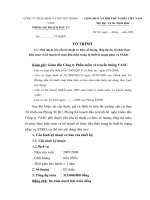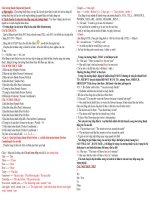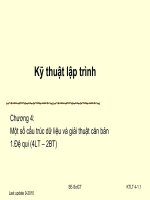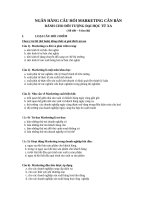cau tuong thuat can ban cung ok lam
Bạn đang xem bản rút gọn của tài liệu. Xem và tải ngay bản đầy đủ của tài liệu tại đây (148.91 KB, 3 trang )
<span class='text_page_counter'>(1)</span><div class='page_container' data-page=1>
<i><b>BASIC REPORTED SPEECH </b></i>
<i><b>(LỜI TƯỜNG THUẬT CĂN BẢN)</b></i>
<b> I/Cách chuyển :</b>
<b>1. Đổi các đại từ trong ngoặc kép:</b>
Ex1: He said,:” <b>I</b> am a student” <i><b>He said he was a student</b></i>
<b> Chủ từ ngôi thứ nhất</b>
Ex2:<b> He</b> said to <b>her</b> : “ <i><b>I</b></i> want <b>you</b> to help <b>me</b>” <i><b>He told her he wanted her to help him</b></i>
<i><b> Chủ từ túc từ thứ nhất thứ hai thứ nhất</b></i>
NHẤT – <b>CHỦ</b> NHỊ- <b>TÚC</b> TAM- <b>NGUYÊN</b>
<b>2. Đổi thì :</b>
Ex1:He said,:” I <b>am</b> a teacher” <i><b>He said he was a teacher</b></i>
Hiện tại quá khứ
Ex2: She said,: “ I <b>was</b> a teacher” <i><b>She said she had been a teacher</b></i>
Quá khứ Quá khứ hoàn thành
HIỆN TẠI - <b>QUÁ KHỨ</b> QUÁ KHỨ – <b>QUÁ KHỨ HOAØN THAØNH</b>
<b>3. Đổi trạng từ và một số động từ: </b>
today / tonight <sub></sub> that day / that night tomorrow <sub></sub> the next day / the following day
next week<sub></sub> the following week yesterday<sub></sub> the day before
last month <sub></sub> the previous month now<sub></sub> then
tomorrow morning<sub></sub> the next morning here <sub></sub> there
ago <sub></sub> before this <sub></sub> that
these <sub></sub> those can <sub></sub> could
may <sub></sub> might must <sub></sub> had to will <b> would</b>
<b> II/ Cụ thể:</b>
<b>1. Dạng lời nói: ( thay đổi các thành phần như trên tuy nhiên còn thay đổi thêm)</b>
A. They said: “ We play games” <i><b>They said that they played games</b></i>
- Lặp lại động từ giới thiệu SAID hay SAID THAT thay cho dấu hai chấm, bỏ dấu ngoặc
keùp
B. They <b>said to</b> her, : “We like you “ <i><b></b><b> </b><b> They told her they liked her</b></i>
- Chuyển SAID TO sang TOLD
<b>2. Dạng mệnh lệnh ( thay đổi các thành phần như trên tuy nhiên còn thay đổi thêm)</b>
<b>a. mệnh lệnh Không :</b>
EX1: She said : “ Don’t help him” <i><b> She told me not to help him</b></i>
Said <b>told me</b> nếu như khơng có chủ từ rỏ ràng. Don’t <b>not to</b>
<b>b mệnh lệnh Khẳng định :</b>
<b>Ex2: </b> He said to her “ Follow me” <i><b> He told her to follow him</b></i>
Said to <b>told V </b><b> to V</b>
<b>3. Dạng câu hỏi ( thay đổi các thành phần như trên tuy nhiên cịn thay đổi thêm)</b>
<b>a. Câu hỏi khơng có từ để hỏi :</b>
Ex: She said : “ Do you help me?” <i><b>She asked me If I helped her</b></i>
Ex: He said to her ” Are you happy ?” <b>He asked her If She was happy</b>
Said <b>asked me</b> khi khơng có chủ từ cụ thể Said to <b>asked</b>
<b>Do/Does</b> thay bằng <b>If</b>/ <b>whethe</b>r và động từ chuyển sang cột hai hay thêm “ ed”
<b>Did</b> thay bằng <b>If/ whether </b>và động từ chuyển sang “ <b>Had + V3/ ed “</b>
<b>Am/is/are</b> viết <b>If</b> /<b>whether </b>và sau đó chuyển sau chủ từ và biến thanh <b>was hay were</b>
<b>Was/ were </b>viết <b>If</b> /<b>whether </b>và sau đó chuyển sau chủ từ và biến thanh <b>had been</b>
</div>
<span class='text_page_counter'>(2)</span><div class='page_container' data-page=2>
ex: She said to him” Where do you live? “ <i><b>She asked him where he lived</b></i>
Said <b>asked me</b> khi không có chủ từ cụ thể Said to <b>asked</b>
<b>Do/Does</b> bỏ và động từ chuyển sang cột hai hay thêm “ ed”
<b>Did</b> bỏ và động từ chuyển sang “ <b>Had + V3/ ed “</b>
<b>Am/is/are</b> chuyển sau chủ từ và biến thanh <b>was hay were</b>
<b>Was/ were </b>chuyển sau chủ từ và biến thanh <b>had been</b>
<b>Can/ will…</b> chuyển sau chủ từ và biến thanh <b>could hay would</b>
<i><b>III/ Bài tập:</b></i>
<b>I. Change into reported speech: Statements: </b>
1. Tom said:” <i>My</i> friend <i>is</i> coming <i>tomorrow</i>.”
2. They said:” We will overcome <i>this</i> difficulty.”
3.The boy said to the neighbor:” <i>I’m</i> going on holiday <i>tomorrow</i>.”
4.The teacher said to his class:” You will have to finish all these exercises before next week.”
5.Peter said to her :” I enjoy looking at you in the mirror.”
6.Nam said “I am told to be at school before 7 o’clock.”
7.Lan said “I will be very busy tomorrow.”
8.Thu said “All the students will have a meeting next week.”
9.Phong said “My parents are very proud of my good marks.”
10.My teacher said to me “You read these books.”
<b>II Change into reported speech: imperatives: </b>
1.He said to me:” Don’t make a noise.”
2. She said to him :” Don’t turn left at the two blocks ahead.”
3. She said to her classmate:” Don’t talk in class.”
4. The teacher said to his student:” Don’t touch that new board.”
5. She said to me:” Don’t believe everything your friend tells you.”
6. The teacher said to his student:” Write these sentences.”
7. She said to me:” behave to your parents as your friend tells you.”
8. He said to us, "Run more quickly."
9. The mother said to her son, “ move here, please.”
10.My sister said to me, “ Open the window.”
<b>III. Change into reported speech: Questions: </b>
1. Hoa said to Lan “Do you like sports?”
2. I said to him,:“Does Hoa play soccer?”
3. They said “Will it rain tomorrow ?”
4. Tuan said to Lan “Are Tam and Hoa late for class?”
5. He asked me “Do you need an umbrella to go out?”
6. “Where are you going?” Lan asked.
7. She asked Lan “Where do you learn English?”
8 Tam’s friend asked him “How long will you stay in England?”
9. Thu asked Hoa “Why is she crying?”
<b>IV Change the following sentences from DIRECT to INDIRECT SPEECH:</b>
1. He said, <i><b>“I will be here at noon.”</b></i>
<i><b>He said that he would be there at noon.</b></i>
2. Mary said, “The train will probably arrive on time.”
3. He said, “I have to finish this report by five o’clock.”
4. The doctor said, “Mr. Smith will improve quickly.”
5. The teacher said, “Everyone has to write a composition.”
6. Mary said to John, “I cannot go to the movie with you.”
7. John said, “I have finished studying my lesson.”
</div>
<span class='text_page_counter'>(3)</span><div class='page_container' data-page=3>
10. William said to me, “I will not see Mr. Jones until Tuesday.”
11. He asked, “How long does it take you to have lunch?”
12. He asked me, “What are you doing at the weekend?”
13. She asked, “Why are you late, Tom?”
14. My mother asked me, “Where is your umbrella?”
15. He said to her, “Who do you want to see?”
16. The students asked, “What time does the bell ring?”
17. He asked Tom, “What kind of films do you like watching?”
18. The teacher asked the girl, “When do you have to be home?”
19. They always asked, “Why don’t you let my cat in?”
20. The passengers asked, “When did the last train leave?”
21. He asked, “What will you do tomorrow, Jane?”
22. She asked, “Do you live with your family, Helen?”
23. He asked, “Can I borrow your pen, Linda?”
24. He said to me, “Does your uncle live in England?”
</div>
<!--links-->









